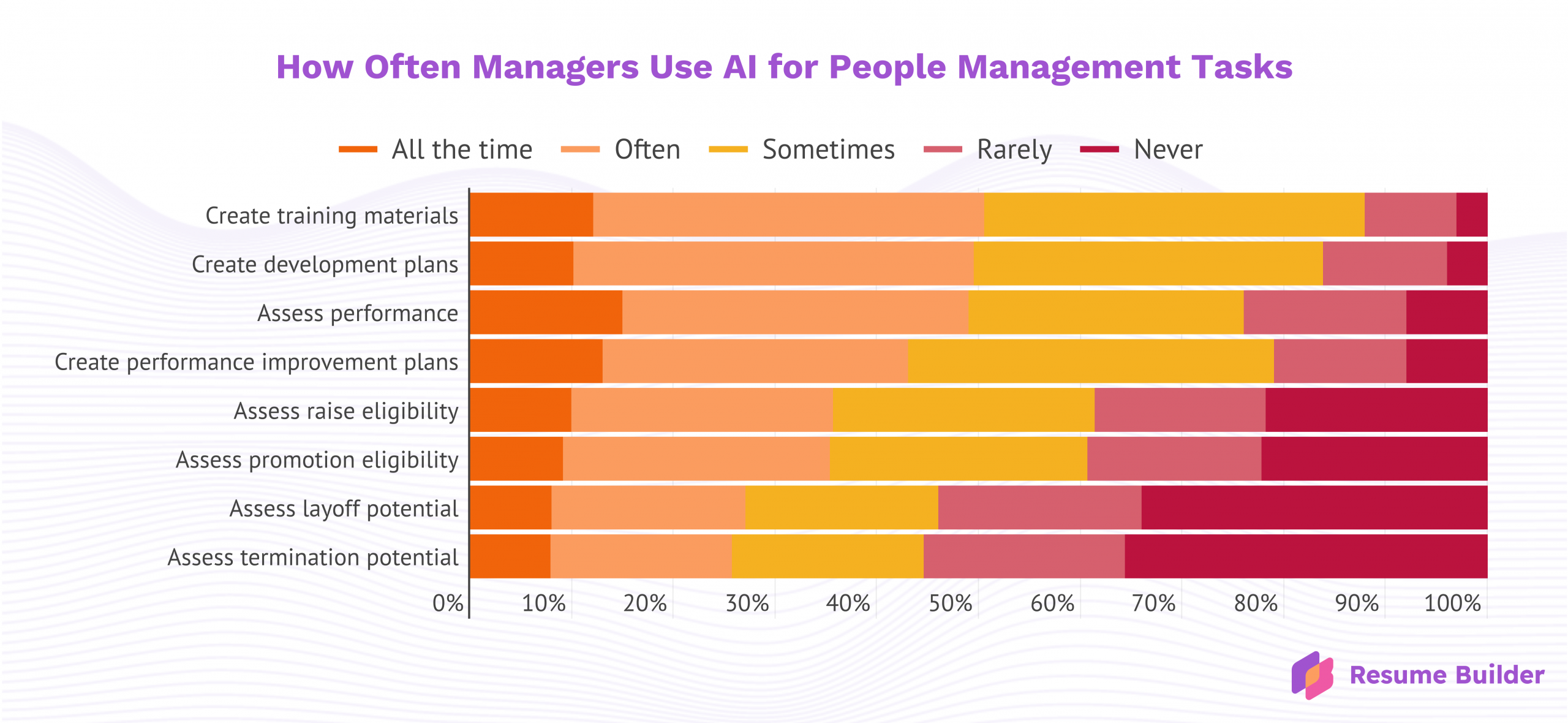According to a new Resume Builder survey of 1,342 U.S. managers with direct reports, a majority of those using AI at work are relying on it to make high-stakes personnel decisions, including who gets promoted, who gets a raise, and who gets fired.
Key findings include:
- 6 in 10 managers rely on AI to make decisions about their direct reports
- A majority of these managers use AI to determine raises (78%), promotions (77%), layoffs (66%), and even terminations (64%)
- More than 1 in 5 frequently let AI make final decisions without human input
- Two-thirds of managers using AI to manage employees haven’t received any formal AI training
- Nearly half of managers were tasked with assessing if AI can replace their reports
6 in 10 Managers Use AI To Make Decisions About Their Direct Reports
About 65% of managers say they use AI tools at work, and among them, nearly all (94%) use them to make decisions about the people who report to them.
When asked which tool they rely on most, ChatGPT takes the top spot, with 53% of AI-using managers citing it as their go-to. About 29% say they primarily use Microsoft’s Copilot, while 16% say they mostly use Google’s Gemini. Just 3% say they primarily use a different AI tool.
Managers use AI to manage their teams in a variety of ways. Nearly all (97%) use it to create training materials, 94% to build employee development plans, 91% to assess performance, and 88% to draft performance improvement plans (PIPs). A majority also use AI to determine raises (78%), promotions (77%), layoffs (66%), and even terminations (64%). Nearly half say they use AI all the time or often for several of these tasks.

1 in 5 Managers Are Often Allowing AI To Make Final Decisions
Among managers who use AI to help manage their teams, a majority (71%) express confidence in AI’s ability to make fair and unbiased decisions about employees.
A notable share of managers let AI operate with limited oversight. More than 20% say they allow AI to make decisions without human input either all the time (5%) or often (16%), while another 24% sometimes do. However, nearly all managers say they are willing to step in if they disagree with an AI-driven recommendation.

Two-Thirds of Managers Haven’t Received Formal Training on Using AI To Manage People
Only one-third (32%) of managers using AI to manage people say they’ve received formal training on ethically using AI in managing people, while 43% have received informal guidance. Nearly one in four (24%) say they’ve received no training at all.
Stacie Haller, chief career advisor at Resume Builder, says risks arise when managers rely on AI to make decisions without proper training.
“It’s essential not to lose the ‘people’ in people management. While AI can support data-driven insights, it lacks context, empathy, and judgment. AI outcomes reflect the data it’s given, which can be flawed, biased, or manipulated. Organizations have a responsibility to implement AI ethically to avoid legal liability, protect their culture, and maintain trust among employees,” says Haller.
A majority of managers say their company encourages them to use AI in people management. Haller explains that companies encourage managers to use it to improve efficiency, enable faster decision-making, reduce overhead, and support data-driven insights that enhance productivity and scalability. However, she notes that for AI to be truly effective in people management, it must be implemented thoughtfully, used responsibly, and always paired with human oversight.
“Organizations must provide proper training and clear guidelines around AI, or they risk unfair decisions and erosion of employee trust,” emphasizes Haller.
1 in 4 Managers Have Replaced Their Direct Reports With AI
About 46% of respondents using AI in people management say they were tasked with evaluating whether AI could replace a position. Among those managers, 57% determined AI could replace the position and 43% followed through and replaced the human position with AI.
Methodology
This survey, launched on June 24, 2025, was commissioned by ResumeBuilder.com and conducted online by the polling platform Pollfish. Overall, 1,342 U.S. full-time manager-level employees were surveyed.
To qualify for the survey, all participants had to be at least 25 years old, have a household income of at least $75,000, hold an associate degree or a higher level of education, have a managerial-level role, and work at a company with more than 11 employees.
Respondents also had to indicate that they currently have employees who report directly to them.
For all media inquiries, contact [email protected].
